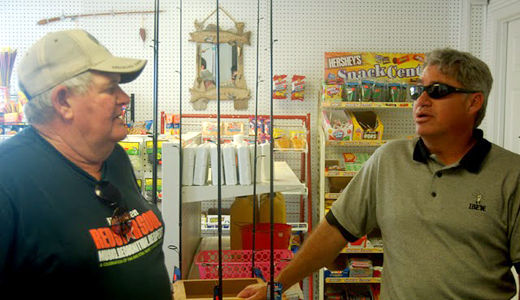
BP says it has put its own reporters “on the ground in the Gulf, meeting the people most immediately affected by the oil spill,” to give the public regular updates.
The latest of these updates, appearing today on the Internet, described what “reporter” Paula Kolmar, writing from Alabama, called “a ballet at sea as mesmerizing as any performance in a concert hall, and worthy of an audience in its own right.”
While the BP reporter was drinking her iced water and watching boats perform ballets amidst playful dolphins and even a shark, oil has drifted close to the Florida shores and some 200,000 workers in the Gulf Coast region are either out of work or facing imminent unemployment as a result of the worst oil spill in U.S. history, according to Robert “Tiger” Hammond, president of the Greater New Orleans AFL-CIO. The impact, he said, is “across the board in the fishing, restaurant, hospitality, food, building trades, health care and many other categories.”
Meanwhile, BP’s Kolmar enthuses, “Though there isn’t oil close to shore, practices and rehearsals occur almost daily in preparation. I was on a jack-up boat observing the practice operations several miles out of Bayou La Batre on a day when the ocean was calm, except for the groups of dolphins swimming around us. Even a shark came along to watch the show. Hot humid conditions intensified by bright sunlight in a cloudless sky were actually made pleasant by the salty sea breezes topped off with lots of sunscreen and bottles of water.
“From the relative comfort of a large square deck with a cold bottle of water always in hand, and an air conditioned TV room with comfy sofas a level below, I witnessed beauty preparing to face the beast, Miss Jasmine, the most experienced local fishing vessel, beautifully painted with a colorful dragon streaming along her sides, pulled the folded boom in place. Then gently pulling along her side, another vessel took on a rope from Miss Jasmine. With barely a pause, the two boats moved apart at the same speed, spreading the booms into a v-shape just like two birds from the sky.”
While the BP reporter was painting this beautiful picture, more waterways were added today to the list of those closed to fishing. That brings the total to one-third of federal Gulf waters now off limits to the industry, along with hundreds of square miles of state waters.
And BP’s latest effort to stop the oil flowing out of its blown out Deepwater Horizon well stalled today when a saw became stuck as it was cutting through a pipe on the well.
The company has given up on stopping the flow of oil until it completes drilling two relief wells in August. Current efforts aim only at containing the flow and siphoning off some of it onto ships on the surface.
“It’s an engineer’s nightmare,” said Ed Overton, a Louisiana State University professor of environmental sciences. “They’re trying to fit a 21-inch cap over a 20-inch pipe a mile away. That’s just horrendously hard to do. It’s like you and I standing on the ground pushing – they’re using little robots to do this.”
Local environmentalists, union leaders and others have said that BP’s best chance to plug the leak – the relief wells – are not a sure thing either. They have noted that the process, which involves trial and error, could take far longer than August and could be delayed even more because of hurricane season.
Thousands of fishermen, including boat owners and workers in the industry, are facing dire financial emergencies.
Chet Held, 48, a lifelong Bayou fisherman in St. Bernard Parish, said, “A lot of people will be bankrupt. We have had to rebuild after Katrina so our homes, our boats, everything is financed. How can we pay? No fishing means no money so we’re finished.”
Held’s uncle, Gary, has been a shrimper even longer. He said, “BP thinks they can come in here and hire people to lay booms or give them a stinking little bit of money and then we’ll shut up. No way. They will have to pay.”
Laurie Burgeret, who works as a secretary for both the New Orleans AFL-CIO and the Building Trades Council, is married to another lifelong shrimper. “That kind of money doesn’t pay for boat insurance or for your house,” she said. “The electric company isn’t going to wait for its money either.”
Burgeret scoffed at Small Business Administration loan trailers being set up on some docks in the area. “What good are loans if you can’t pay the bills you have now?”
Meanwhile, the federal government is increasing its response.
Attorney General Eric Holder has announced that a criminal investigation is under way.
The investigation is critical because if BP violated any laws, a $75 million liability cap would automatically be lifted. The GOP has blocked three Democratic attempts to lift the cap.
Environmentalists note, however, that there are numerous laws in place that can already be used to make BP pay some of its damages.
The Clean Water Act of 1972, for example, gives the Environmental Protection Agency the power to fine BP up to $4,300 per barrel of oil spilled into the Gulf. If the flow of oil continues at its current rate until August the EPA could demand nearly $11 billion in fines.
Photo: Chet Held, right, and his uncle Gary, two lifelong fishermen from St. Bernard Parish, La. PW/Blake Deppe

MOST POPULAR TODAY

‘Warning! This product supports genocide’: Michigan group aims to educate consumers

Hold the communism, please: SFMOMA’s Diego Rivera exhibit downplays artist’s radical politics

Ohio: Franklin County treasurer attends Netanyahu meeting, steps up Israel Bond purchases

“Trail of Tears Walk” commemorates Native Americans’ forced removal

After months of denial, U.S. admits to running Ukraine biolabs






Comments